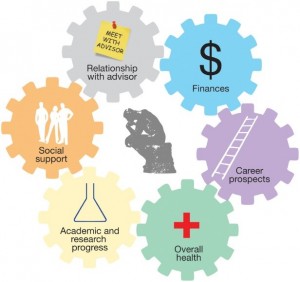
Towards Sustaining a Culture of Mental Health and Wellness for Trainees in the Biosciences, written by Jessica W Tsai and Fanuel Muindi, discussed the importance of mental health of postdocs in benefiting the scientific community at large. Studies are limited, but we can see we clearly have work to do. According to one study, only 13% of postdocs are “flourishing” and we know that a postdoc position doesn’t lend itself to regular exercise, healthy diets, or good stress relieving practices. Lack of sleep and high levels of stress actually impede performance. Bottom line: our work will get better if we take care of ourselves!
As the figure above shows, there are many factors that contribute to well-being. Do your own self-assessment to see where you have areas of strength and where you may need to seek more support. If you are experiencing significant stress, anxiety, or depression, there are offices that can help. You may be eligible for accommodations – even on a temporary basis – and it can be worth discussing with the Disability Services Office.
The UW Mindfulness Project aims to increase holistic wellness, self-inquiry, grounded leadership and compassion within UW community and beyond. Check out their Facebook Page.
Health & Wellness provides support, advocacy, consultation and education to the UW campus community. Check out their website for more information.
For additional resources and suggestions on many dimensions of self-care, visit the UC Berkeley “Be Well” page.
Originally posted on March 24, 2016.